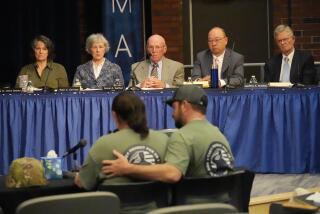Congress falls short on oil spill safety, panel says
WASHINGTON — Two years after the Deepwater Horizon explosion unleashed the worst oil spill in American history, Congress has failed to take meaningful action to prevent a similar disaster, according to a new report from members of a presidential panel.
The report cited significant progress by the Obama administration and the oil industry, giving them a B and a C+ grade, respectively, for their efforts to bolster safety, spill response and resources. Congress, however, got a D grade for its inability to “enact any legislation responding to the explosion and spill.”
The assessments were graded against the panel’s year-old recommendations.
The report by members of the National Commission on the BP Deepwater Horizon Oil Spill and Offshore Drilling complained that Congress had failed to pass legislation requiring the offshore oil and gas industry to bear the costs of federal oversight through fees on leasing and permitting reviews. The presidential panel had also recommended that the $75-million liability cap for offshore oil spills be increased substantially.
The Democratic-controlled Senate has passed a bill to funnel penalties from the spill to restoring the Gulf of Mexico’s ecosystem, but House Republicans have yet to approve it.
Several recent developments signal the need for more serious steps to bolster offshore drilling safeguards, the report said. In the last 10 months, “at least three offshore oil and gas rigs around the world have experienced significant leaks, demonstrating again and again how risky this activity is,” the report said. “Risks will only increase as drilling moves into deeper waters with harsher, less familiar environmental conditions.”
Some senior administration and congressional staffers complained that the report used simple letter grades to sum up complicated efforts. But Interior Secretary Ken Salazar echoed the criticisms of Congress.
“Two years after the Deepwater Horizon, it’s inexcusable that the Congress has not done more to help us make sure that the energy security of the United States is protected in a way that will ensure that we will continue to develop our oil and gas resources in a safe and responsible way,” Salazar said.
The report, “Assessing Progress,” credited the administration for reorganizing the federal agency that oversees offshore energy into two separate entities in order to eliminate conflicts of interest and strengthen environmental reviews.
The report highlighted industry’s creation of two consortia to respond to and contain spills. But it also warned that the necessary equipment may be far from the site. It also noted that an independent government auditor concluded recently that there was “limited assurance of an operator’s ability to respond to a sub-sea blowout.”
Sens. Mary L. Landrieu(D-La.) and Lisa Murkowski (R-Alaska) said in a statement that they shared the commission’s frustrations and blamed other colleagues for the gridlock on legislation.
“A bipartisan majority in the Energy Committee and the full Senate would be happy to pass common-sense legislation addressing new production, safety and a fair share of revenue for the affected states,” they said. “Unfortunately, a small number of senators are opposed to engaging in a debate that includes revenue sharing.”
More to Read
Sign up for Essential California
The most important California stories and recommendations in your inbox every morning.
You may occasionally receive promotional content from the Los Angeles Times.











